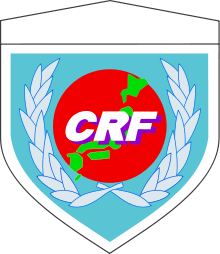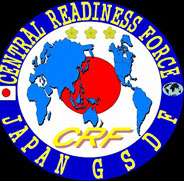Central Readiness Force
| Central Readiness Force | |
|---|---|
|
Official Central Readiness Force insignia | |
| Active | March 28, 2007 – present |
| Country |
|
| Branch |
|
| Type | Rapid Reaction Force |
| Role |
Special operations Direct Action Air assault Unconventional Warfare Domestic and International Counter-Terrorism Counter-Piracy operations Airborne assault Anti-NBC Warfare Aerial Transportation Military Training Units |
| Size | ~ 4,500 personnel |
| Part of | See Formation |
| Garrison/HQ | Camp Zama, Sagamihara, Kanagawa Prefecture |
| Nickname(s) | CRF |
| Engagements |
United Nations Mission in Nepal United Nations Integrated Mission in East Timor United Nations Disengagement Observer Force Zone United Nations Stabilisation Mission in Haiti Counter-piracy operations in Somalia[1] |
| Commanders | |
| Current commander | Lt. Gen. Hiromichi Kawamata |
| Notable commanders | Josho Yamaguchi |
The Central Readiness Force (中央即応集団 Chūō Sokuō Shūdan) was established on March 28, 2007, following the upgrading of the Japanese Defense Ministry from the former Japanese Defense Agency.[2] It was initially based at Japan Ground Self-Defense Force (JGSDF) Camp Asaka in Nerima, Tokyo. The command supervises a number of different units, whose roles range from special forces operations to advance preparation for greater JSDF deployments. The unit can also be deployed as Japan's response to combat operations during peacekeeping missions as a rapid reaction force.[3] In March 2009, the force was transferred to Camp Zama, in Sagamihara, in the Kanagawa Prefecture. As a part of the Japanese government's National Defense Program Guidelines which were developed in response to the need to improve the JGSDF's capabilities to deal with new defense issues such as foreign peacekeeping operations and anti-terrorist operations.[3]
The CRF held a formal ceremony at Camp Askaka on March 31, 2007, during which Japanese Defense Minister Fumio Kyuma, who was the guest of honour, formally inaugurated the force. Lieutenant General Josho Yamaguchi (山口淨秀 陸将, Yamaguchi Josho Rikushō) was the CRF's first commanding officer.[3] The current commander of the CRF is Lt. Gen. Masahiro Hidaka, who was appointed on July 26, 2012.
History
Formed on March 28, 2007, the CRF was established, consolidating the 1st Airborne Brigade, the 1st Helicopter Brigade, the Japanese Special Forces Group and the 101st NBC Protection Unit into a single force capable of conduct operations both in Japan and in foreign countries.[3][4] On March 31, 2007, the Central Readiness Force held a formal inauguration ceremony at JGSDF Camp Asaka in Nerima, Tokyo, which included guests such as Fumio Kyuma and Josho Yamaguchi, the former presiding over the formal establishment of the CRF.[4]
The CRF was deployed on its first civil disaster mission on April 29, 2007, when it was dispatched to quell wildfires in the forests of the Yamanashi Prefecture, with the 1st Helicopter Brigade being deployed after its integration to the force.[5] The CRF later conducted a military exercise on October 31, 2007, with its subordinate units participating in a wide range of scenarios from anti-NBC cleanup to personnel transportation and evacuation.
Six officers from the CRF were deployed to Nepal as part of the United Nations Mission in Nepal on March 30, 2007 as part of their first CRF peacekeeping mission.[6][7][8] A CRF officer deployed to Nepal as part of the UNMIN was decorated for completing his duties in monitoring the ceasefire between the Nepalese government and Maoist rebels.[9] The officers returned to Japan on March 18, 2008.[10] Four CRF officers under the UNDOF's transport unit were deployed to France as Japanese representatives on July 14, 2008, for its annual Bastille Day Military Parade celebration.[11] The CRF was deployed to assist in the aftermath of the Tōhoku earthquake and tsunami in humanitarian relief efforts, as well as to combat radiation problems at the Fukushima nuclear power plant.[12][13]
The CRF has been deployed in Djibouti in the Horn of Africa. Asahi Shimbun wrote in January 2015 of plans to reinforce the JSDF base in Djibouti, Africa including mobilizing light armored vehicles to rescue Japanese citizens by land routes.[14]
Command Group
| Position | Name (Japanese) | Rank | Day of Appointment | Previous Position |
|---|---|---|---|---|
| Commanding General | Hiromichi Kawamata (川又弘道) | Lieutenant General | August 5, 2014 | Commander of the 4th Division |
| Vice Commanding General | Kenji Kitō (鬼頭健司) | Major General | December 19, 2014 | Staff of the Ground Staff Office |
| Mitsuhiko Horikiri (堀切光彦) | August 5, 2014 | Inspector General of the Inspector General's Office of Legal Compliance | ||
| Chief of Staff | Yoshihiko Isaki (伊崎義彦) | Colonel | August 22, 2013 | Commander of the International Peace Cooperation Activities Training Unit |
| Vice Chief of Staff | Hajime Inoue (井上一) | March 30, 2015 | Commander of the Training Evaluation Unit | |
| Akiomi Setoyama (瀬戸山昭臣) | March 30, 2015 | Senior R&D Officer of the Ground Research and Development Command |
Structure
The structure of the CRF has been created with the following established for its headquarters:
Chain of command
- Commander (Lieutenant General)
- Deputy Commander for Domestic Operations (Major General)
- Deputy Commander for International Operations (Major General)
- Chief of Staff (Colonel)
- Vice Chief of Staff (2 officers with rank of Colonel)
Divisions
- Personnel
- Intelligence
- Defense Plans & Operations
- Logistics
- Administration
- Accounting
- Communications
- National Welfare
Personnel
- Reporting Officer
- Army Surgeon
- Inspector
- Law Officer
- Staff Manager
- Adjutant
Formation
The following is the formation of the CRF as of 2011:[15]
- Headquarters – Camp Asaka, Nerima, Tokyo
- 1st Airborne Brigade – Camp Narashino, Funabashi, Chiba
- Central Readiness Regiment – Camp Utsunomiya, Utsunomiya, Tochigi - the Central Readiness Regiment (CRR) has the ability to form advance missons to conduct preparations for main JSDF missions.[16]
- Japanese Special Forces Group – Camp Narashino, Funabashi, Chiba
- 1st Helicopter Brigade – Camp Kisarazu, Kisarazu, Chiba
- Central Nuclear Biological Chemical Weapon Defense Unit – Camp Ōmiya, Kita-ku, Saitama with 155 personnel
- NBC Counter Medical Unit – Camp Asaka, Nerima, Tokyo with 70 personnel
- International Peace Cooperation Activities Training Unit – Camp Komakado, Gotemba, Shizuoka
Symbols
The following are represented in the insignia and patch of the Central Readiness Force:
CRF insignia

- Purple Shadow – CRF's joint cooperation with the Japanese Ground Self-Defense Forces, the Japanese Maritime Self-Defense Forces and the Japanese Air Self-Defense Forces.[17]
The insignia symbolizes the CRF's mandate to operate in Japanese soil.[17]
CRF patch

- Cherry Blossoms – CRF's commanding officer.[17]
The patch symbolizes the CRF's mandate to operate in foreign territory as a representative of Japan in Peacekeeping missions.[17]
References
- ↑ "2ND LD: Japan orders MSDF dispatch for antipiracy mission off Somalia". iStockAnalyst. 2009-03-13. Archived from the original on 2012-07-19. Retrieved 2012-07-19.
- ↑ Japan launches counter-terrorism force. Retrieved on June 6, 2008.
- 1 2 3 4 中央即応集団 《朝霞》 3200名、編成を完結. Retrieved on September 9, 2012.
- 1 2 国際活動をめぐる陸上自衛隊の組織改編 鈴 木 滋 Archived October 13, 2012, at the Wayback Machine.
- ↑ 山梨県甲州市勝沼町山林火災災害派遣 (第1ヘリコプター団). Retrieved on August 24, 2011. (Japanese)
- ↑ ネパールへの国際平和協力法に基づく軍事監視要員の派遣について
- ↑ 国連ネパール政治ミッションへの軍事監視要員の派遣について
- ↑ Army Winter 2009 Pamphlet.
- ↑ 第4次軍事監視要員の帰国出迎え 23.1.18.
- ↑ "International Peace Cooperation Activities in Nepal". Japan Defense Focus, Japanese Ministry of Defense. Retrieved 2011-08-25.
- ↑
- ↑ "GSDF special forces unite in water-spraying mission". Daily Yomiuri. 2011-03-22. Archived from the original on 2011-04-03.
- ↑ "Operation Order (12 March, 2011)". Japanese Ministry of Defense. 2011-03-12. Retrieved 2011-04-04.
- ↑ "Archived copy". Archived from the original on 2015-02-11. Retrieved 2015-02-08.
- ↑ CRF Organization. Archived January 24, 2013, at the Wayback Machine.
- ↑ https://books.google.com.au/books?id=cxVHBQAAQBAJ&pg=PT72&lpg=PT72&dq=%22Central+Readiness+Force%22+special+forces&source=bl&ots=U9i96Ct6md&sig=DzPjx_hSRWp0MkyDkXux9zryydI&hl=en&sa=X&ei=nvDWVIyIIIWK8QXmwILoAQ&ved=0CDMQ6AEwBTgU#v=onepage&q=%22Central%20Readiness%20Force%22%20special%20forces&f=false (Aoi and Heng, Asia-Pacific Nations in International Peace Support and Stability Missions, Palgrave Macmillan, 2014)
- 1 2 3 4 5 6 7 8 CRF insignia and symbol. Archived February 24, 2008, at the Wayback Machine. Retrieved on January 11, 2008.
- Aoi and Heng, Asia-Pacific Nations in International Peace Support and Stability Missions, Palgrave Macmillan, 2014
External links
- Official Page (Japanese)
- Official Page (English)